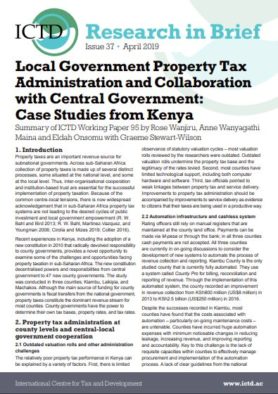Research in Brief 37
Property taxes are an important revenue source for subnational governments. Across sub-Saharan Africa collection of property taxes is made up of several distinct processes, some situated at the national level, and some at the local level. Thus, inter-organisational cooperation and institution-based trust are essential for the successful implementation of property taxation. Because of the common centre-local tensions, there is now widespread acknowledgement that in sub-Saharan Africa property tax systems are not leading to the desired cycles of public investment and local government empowerment (R. W. Bahl and Bird 2013; R. W. Bahl, Martinez-Vazquez, and Youngman 2008; Cirolia and Mizes 2019; Collier 2016). Recent experiences in Kenya, including the adoption of a new constitution in 2010 that radically devolved responsibility to county governments, provides a novel opportunity to examine some of the challenges and opportunities facing property taxation in sub-Saharan Africa. The new constitution decentralised powers and responsibilities from central government to 47 new county governments. The study was conducted in three counties; Kiambu, Laikipia, and Machakos. Although the main source of funding for county governments is fiscal transfers from the national government, property taxes constitute the dominant revenue stream for most counties. County governments have the power to determine their own tax bases, property rates, and tax rates. This is a 2-page summary of Working Paper 95 by Rose Wanjiru, Anne Wanyagathi Maina & Eldah Onsomu with Graeme Stewart-Wilson
